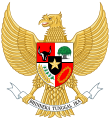Regional Representative Council: Difference between revisions
added Category:People's Consultative Assembly using HotCat |
JarrahTree (talk | contribs) →Powers and structure: overlinking |
||
| Line 39: | Line 39: | ||
==Powers and structure== |
==Powers and structure== |
||
The DPD can propose such bills to the |
The DPD can propose such bills to the People's Representative Council (''Dewan Perwakilan Rakyat''/DPR) and must be heard on any regional bill proposed by the DPR. Each province elects 4 members to the DPD on a non-partisan basis, although many candidates in the April 2004 election had links to the parties represented in the People's Representative Council, the ''Dewan Perwakilan Rakyat'' or DPR. |
||
A third legislative body, the |
A third legislative body, the People's Consultative Assembly ({{lang-id|Majelis Permusyawaratan Rakyat}}) (MPR), comprises the members of the DPR and the DPD. |
||
==References== |
==References== |
||
Revision as of 00:27, 1 May 2011
The Regional Representative Council Dewan Perwakilan Daerah | |
|---|---|
 | |
| Type | |
| Type | |
| Leadership | |
Speaker | Irman Gusman since 1 October 2009 |
| Seats | 132 |
| Elections | |
Last election | 9 April 2009 |
| Meeting place | |
| Legislative Complex Jakarta Indonesia | |
| Website | |
| www.dpd.go.id | |
| This article is part of a series on the |
| Politics of Indonesia |
|---|
 |
The The Regional Representative Council (Indonesian: Dewan Perwakilan Daerah, DPD) is one of two parliamentary chambers in Indonesia. Together with the People's Representative Council, it makes up a third chamber, the People's Consultative Assembly.[1]
History
The DPD was created by the third amendment to the 1945 Constitution of Indonesia enacted 9 November 2001 in a move towards bicameralism. The DPD does not have the revising powers of an upper house like the United States Senate. Article 22D restricts the DPD to dealing with bills on "regional autonomy, the relationship of central and local government, formation, expansion and merger of regions, management of natural resources and other economic resources, and Bills related to the financial balance between the centre and the regions."[2][3]
The International Foundation for Electoral Systems conducted a tracking survey in the Indonesian legislative elections in 2004 which showed that not all voters knew how to vote for candidates for the new Regional Representative Council, or were even aware of its existence.[4]
Powers and structure
The DPD can propose such bills to the People's Representative Council (Dewan Perwakilan Rakyat/DPR) and must be heard on any regional bill proposed by the DPR. Each province elects 4 members to the DPD on a non-partisan basis, although many candidates in the April 2004 election had links to the parties represented in the People's Representative Council, the Dewan Perwakilan Rakyat or DPR.
A third legislative body, the People's Consultative Assembly (Indonesian: Majelis Permusyawaratan Rakyat) (MPR), comprises the members of the DPR and the DPD.
References
- Denny Indrayana (2008) Indonesian Constitutional Reform 1999-2002: An Evaluation of Constitution-Making in Transition, Kompas Book Publishing, Jakarta ISBN 978-979-709-394-5
Notes
- ^ Denny Indrayana (2008), p369
- ^ Denny Indrayana (2008), p446
- ^ Law No. 20/2008 on Elections
- ^ na Thalang, Chanintira (2005). "The Legislative Elections in Indonesia, April 2004". Electoral Studies. 24 (2): 326–332. doi:10.1016/j.electstud.2004.10.006.
{{cite journal}}:|access-date=requires|url=(help); Unknown parameter|month=ignored (help)
External links
- DPD homepage (Indonesian)
